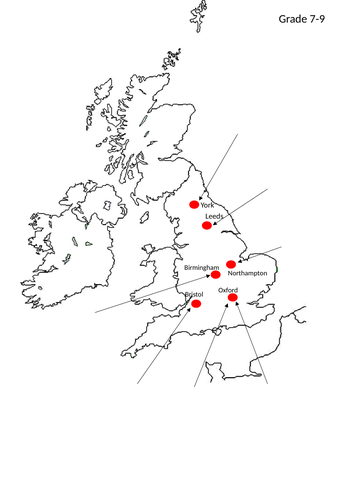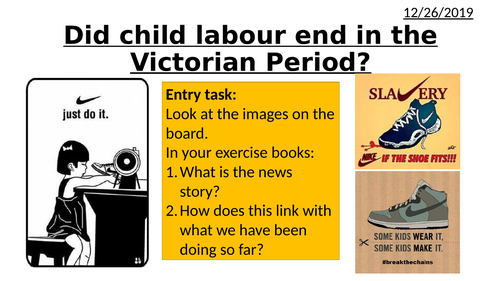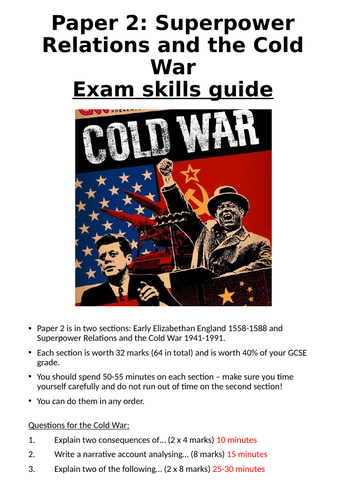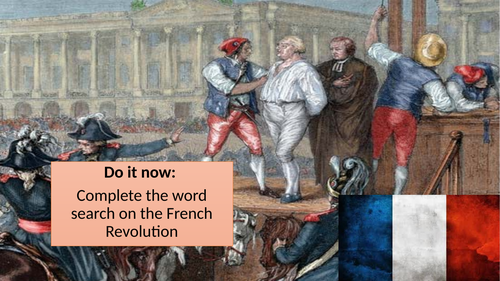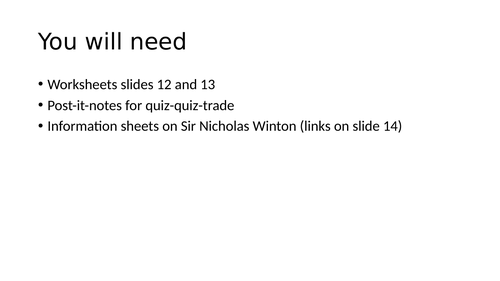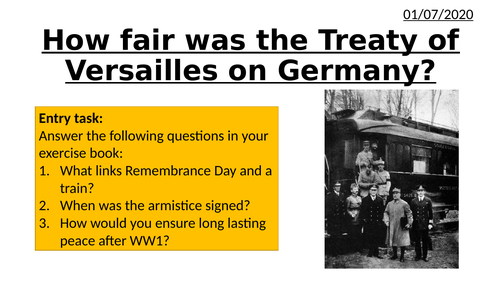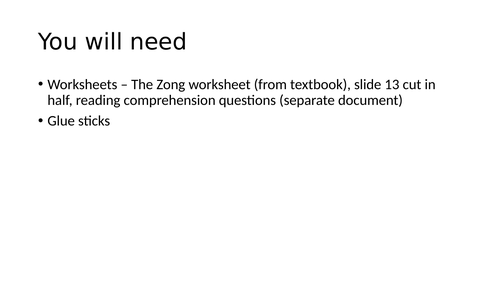338Uploads
118k+Views
41k+Downloads
All resources

WW1 Causes: Alliances and Militarism
Suitable for teaching 11-14 Causes of WW1. This lesson is on alliances and militarism.
Whole lesson plus resources on alliances and militarism. Includes videos, source analysis and questions on militarism.
Please review if you purchase and check out my other WW1 resources.

The Battles of the English Civil War
Suitable for teaching KS3 Charles I and the English Civil War.
Whole lesson looks at the battles of Civil War, with a particular emphasis on Marston Moor. The lesson includes differentiated tasks, such as a card sort of the battles either onto a timeline or on a map of the UK. Students also look at Marston Moor in detail and how it was fought.
Please review if you purchase and check out my other Charles I and the English Civil War resources!

Industrial Revolution - Child Labour
Whole lesson plus all resources and worksheets needed for teaching: Did child labour end in the Victorian Period?
This is a fascinating lesson that gets students to think about modern day child labour and compare it with Victorian child labour.
Students will look at the work completed by children in the Victorian Period through a variety of tasks, and then they will assess the situation today, first by looking at the case study of Nike using child labour (great link to History in the news), followed by a selection of videos that go through the modern day child labour situation. They will also research the various government acts put in place to stop child labour, using the information sheet (PROVIDED!) onto a differentiated table.
Students will then complete one of three differentiated tasks assessing child labour.
Please review if you purchase, and check out my other Industrial Revolution resources, such as ‘life for children in the factories’.

GCSE History Paper 2 Skills Guide: Cold War
A skills booklet given as a revision guide for students on how to answer the different exam questions for Edexcel GCSE 9-1 Paper 2 Superpower Relations and the Cold War.
Includes;
Guide on how to answer each question
Answer structure broken down step-by-step
Exemplar answers with colour coding
A list of practice questions
Please review if you purchase and check out my other Cold War resources and lessons.

Why do Muslims go on Hajj? | Islam
KS3 Religious Studies - Lesson 4 of the Islam scheme of work
This lesson looks at ‘Why do Muslims go on Hajj?’.
This lesson looks at what are pilgrimages, the history of Mecca and why Muslims go on Hajj. Students will also look at what Muslims do whilst on Hajj and the different aspects of it using an information sheet (included!). There is also an interesting look at the impact of Covid-19 on Muslims going on Hajj as a plenary.
All worksheets and resources needed are included – ready to download and teach!
Feedback is welcome, please check out the rest of my lessons in the Islam scheme of work.

Respecting the Qur'an | Islam
KS3 Religious Studies - Lesson 5 of the Islam scheme of work
This lesson looks at 'How do Muslims respect the Qur’an?'
This lesson looks at:
Origins of the Qur’an
Contents of the Qur’an
Memorising the Qur’an
Respecting the Qur’an
This lesson focusses on how and why Muslims respect the Qur’an. There is also an interesting look at the Qur’an in the news where libraries did not store the Qur’an on the top shelf - and why it is important that everyone respects the holy books of others. The lesson finishes with a key word glossary task.
All worksheets and resources needed are included – ready to download and teach!
Feedback is welcome, please check out the rest of my lessons in the Islam scheme of work.

Symptoms and Causes of the Black Death
Suitable for KS3 - uses skills and knowledge required for teaching Edexcel GCSE Medicine Through Time!!
Start your KS3 early and ready for the new GCSE specification.
Whole lesson includes differentiated activities and resources on the symptoms and causes of the Black Death.
Feedback is welcome and please check out my whole SoW on the Black Death for KS3

Treatments & Preventions of the Black Death
Suitable for KS3 using skills and knowledge needed for Edexcel GCSE Medicine Through Time Black Death case study!!!
Start your students early in preparation for GCSE. Looks at the Four Humours, miasma and more.
Whole lesson includes differentiated activities and resources.
Feedback is welcome and please check out my whole SoW for the Black Death for KS3.

Consequences of the Black Death
Suitable for KS3 using skills and knowledge needed for Edexcel GCSE Medicine Through Time (Black Death case study!)
Start students early ready for GCSE History.
Whole lesson with differentiated activities and all resources included.
Feedback welcome, and check out my whole KS3 SoW for the Black Death!

What caused the French Revolution?
Whole lesson plus resources on 'What caused the French Revolution?'
Includes a fun interactive activity where you split the class into peasants and nobility and they are given a series of scenarios which they have to pay the king (you)… I have had great fun with this lesson!

Holocaust Hero - Nicholas Winton
Whole lesson plus resources for teaching the Holocaust.
This lesson looks at the work of Sir Nicholas Winton - the Holocaust hero who saved 669 Jewish children.
The lesson starts with a ‘guess the story’ and a reveal of Nicholas Winton. The video shows Nicholas Winton on ‘this is your life’ and the audience are revealed to the be children he saved. I guarantee the class will be crying!!
Students absolutely love this lesson and find his story incredibly touching. A wonderful ‘happy story’ of the Holocaust.
Please review if you buy and check out my other resources.

How can religion answer Big Questions?
KS3 Philosophy and Ethics - Lesson 5 of the ‘What Big Questions are there?’ Scheme of Work.
This lesson looks at 'Can religion answer the Big Questions?
This lesson looks at why does God allow suffering and how religion may be able to answer some of life’s big questions.
By the end of the lesson, students will be able to:
Judge which reason you believe has the strongest argument and explain your personal view about why bad things happen.
Explain with examples different reasons God allows bad things to happen.
Consider reasons why God allows bad things to happen.
Feedback is welcome, please check out the rest of my lessons in the ‘What Big Questions are there?’

King John - Good King Bad King?
For 11-14s, can be adapted for KS2.
An introduction lesson for King John, looking at whether he can be considered a good king or a bad king. Students will compare his rule with other monarchs to reach a substantiated judgement.
Entire lesson plus worksheets and information booklet. Tasks differentiated to suit different abilities.
Please review if you purchase, and check out my other King John lessons and resources.

Treaty of Versailles - Fair or Unfair?
Whole lesson plus all resources needed for teaching **** ‘How fair was the Treaty of Versailles on Germany?’****
Students first look at the end of WW1 and how the Treaty of Versailles came about.
Then, students analyse the aims of the Big Three, using role play, sorting them into
Punish Germany and get revenge
Weaken Germany so it cannot threaten Europe again
Reward/compensate the Allies
Students will then look at the terms of the treaty using a video, and decide if those terms were fair or unfair by sorting card statements (differentiated!).
Please review if you purchase, and check out my other WW1 and WW2 resources on my shop.

The Middle Passage - The Zong
For teaching 11-14s Slave Trade - The Middle Passage INCLUDING the case study The Zong!
Whole lesson plus worksheets on the Middle Passage. Students will first understand what the Middle Passage is with reference to the Triangular Trade. Students will then look at the conditions in the Middle Passage watching the clip from ‘Amistad’ and answering quiz questions on a worksheet (provided). Students will then look at the case study of the Zong. Here, students will read a passage about the case study of the Zong and choose from 3 differentiated options; answering comprehension questions, write a letter from the ship, or writing a speech to judge explaining why the slave trade owners on the Zong were guilty of murder.
This is a fascinating lesson which encourages students to consider the implications of the slave trade; and begin to look at the abolition of the slave trade.
Please review if you purchase, and check out my other slavery resources!

What is Religion?
Suitbale for 11-14/ KS3 Philosophy and Ethics - Lesson 1 of the Science and Religion SoW.
This lesson looks at ‘What is Religion’?
Students will be able to:
Explain what a religion is using specific examples.
Describe your expectations of what a religious person should be.
Understand what religion is.
Name at least 3 religions.
All resources included!
Feedback is welcome, please check out the rest of my lessons in the Science and Religion Scheme of Work!

What is Science?
KS3 Philosophy and Ethics - Lesson 3 of the Science and Religion SoW.
This lesson looks at ‘What is Science’?
Students will be able to:
Explain what the scientific method is and use it to look at real life experiments.
Discuss at least two things that science now explains that used to be explained by religion.
State at least three areas that are involved in science.
All resources included!
Feedback is welcome, please check out the rest of my lessons in the Science and Religion Scheme of Work!

Holocaust: Warsaw Ghetto
For teaching 11-14s Holocaust
This lesson looks at 'What was life like in the Warsaw Ghetto?'
Students will start by looking at what is a ghetto and their locations across occupied Europe. This also includes a timeline of how the ghettos came to be.
Students will then look in depth at the Warsaw Ghetto by watching a series of videos by Yad Visham on YouTube. They will also look at a letter written from Warsaw Ghetto and complete one of three differentiated tasks!
Finally students will write their own letter from the Warsaw Ghetto describing what life was like.
This lesson is differentiated for all students in your class, and includes all resources needed. Minimal resources needed - perfect for even setting as cover!
Feedback is welcome, and please check out my other Holocaust lessons and materials.

Modern Prisons HOME LEARNING
This is a home learning lesson for teaching life in Modern Prisons - suitable for KS2 or KS3.
This lesson comes with an answer sheet!
This lesson includes a variety of tasks and activities which can be completed by a student. This was designed to be completed independently and all information and resources needed are included in the lesson!
This is perfect for parents who can print this off and give to their child, or for teachers to set online as students can fill in the pages. Includes a word document for editing, or a PDF version to be printed straight away!
Please review if you purchase, feedback is welcome.

What is the Religious Method?
KS3 Philosophy and Ethics - Lesson 2 of the Science and Religion SoW.
This lesson looks at ‘What is the Religious Method’?
Students will be able to:
Explain why you think religion is important.
Use the ‘religious method’ to decide what societies have a religion.
Describe what the ‘religious method’ is used for.
Give two expectations you have of religious people.
All resources are included.
Feedback is welcome, please check out the rest of my lessons in the Science and Religion Scheme of Work!


